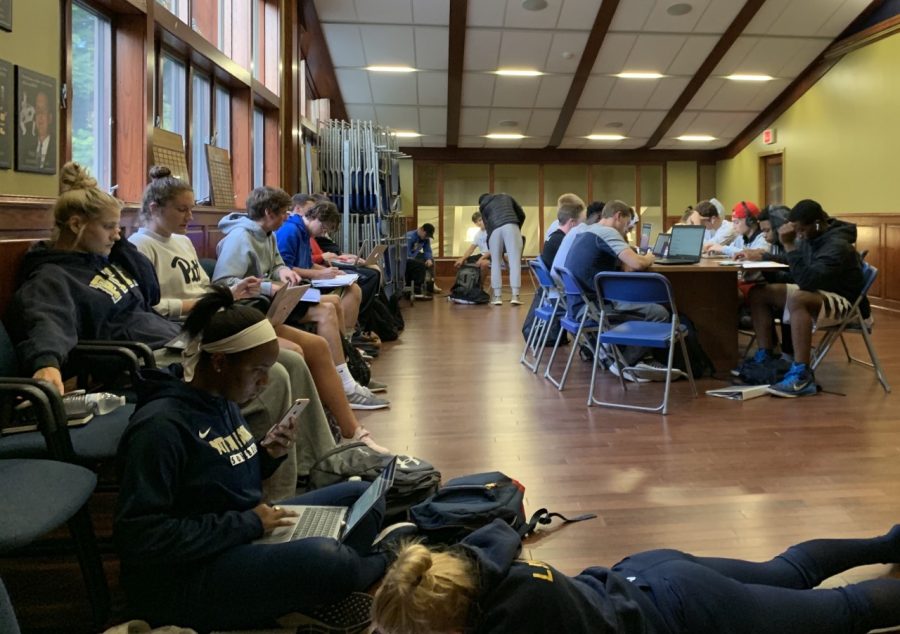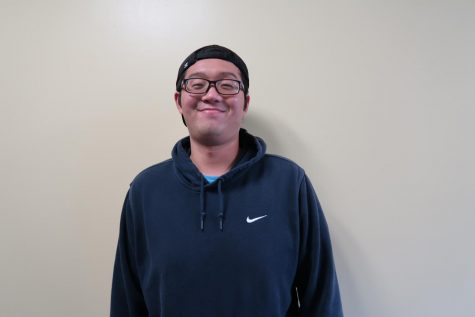Could jocks be smarter than nerds?
Student-athletes get academic help Sept. 24 during an athletics study hall on the Sports Center’s second floor.
October 2, 2019
In 2019, Pitt-Johnstown athletic coaches and athletes not only made achievements in athletics, but also had good academic performance.
According to Assistant Academic Affairs Vice President Stephen Kilpatrick, in the 2017 academic year, the overall GPA for all students was 2.88. In the 2018 academic year the overall GPA was 2.92. He said the overall GPA slowly increased during the past year.
Pat Pecora, Pitt-Johnstown athletic director, said the overall GPA for student athletes increased from 2.96 (2017) to 3.17 (2018).
“Last year was very productive. All coaches knew the academic importance to athletes and helped, the improvement of athletes GPA.
“They must be a student first, then they are athletes.” Pecora said.
Raymond Wrabley, the Pitt-Johnstown NCAA faculty athletic representative, has followed athletes’ academic performance to give reports to Pitt-Johnstown president Jem Spectar for 12 years, said student-athletes have better academic standing than the average students.
“The student-athletes have GPA higher than 3.0 over a couple semesters better than average students GPA.“
According to Wrabley, the graduation rate for Pitt-Johnstown students is just over 50, but the Pitt-Johnstown student-athlete averaged over 70.
“There is an important thing that I want to say that is the distribution and proportion of athletes’ majors is almost the same as non-athlete students.”
Wrabley said athletes’ better-than-average academic performance may be a result of their superior time-management skills needed to balance practice, training and study.
“From high school, the student-athletes are used to studying hard and practicing hard, and I think it’s a good habit for them to do the job well in college, too.
“During the season, they need to train 20 hours per week to make sure they have good athletic achievement.
“Their coaches are doing a good job pushing athletes to have good academic standing and the student-athletes will study bus rides to competitions. The coaches require the lower academic-standing athletes and all incoming athletes to participate study halls.
“If there is an athlete with a lower GPA, his coach needs to ask about his homework, quiz grades and exam grades to make sure he is on the right track.
“The non-athlete students don’t have coaches to push their study, and the Academic Success Center also has an important role in it,
“I also think that the student athletes’ group culture helps them to achieve a good academic achievement due to having 20-30 athlete friends to help. This is what normal students don’t have,” Wrabley said.
According to Pecora, the average female student-athlete’s grades are better than male student athletes’. The Pitt-Johnstown women’s soccer team leads to the whole athletic department with a 3.45 GPA.
Sophomore Cassie Pascarella, the right front for Pitt-Johnstown women’s volleyball team, is a civic engineering major with a 3.97 GPA.
“I usually make my studies a priority. I’ll make time to finish my class assignments before I go to training every time.
“If I don’t finish my homework before I go to training, then I’ll take a quick shower to finish it.
“I’ll also spend most of my weekend studying. If I have to miss classes, I’ll coordinate with my professor as early as I can to make it up,” Pascarella said.
Not only women student athletes have good academic standing, but male athletes do as well.
The Pitt-Johnstown men’s basketball team topped all conference men’s basketball teams in overall with a 3.227 GPA.
Pitt-Johnstown men’s head basketball coach Bob Rukavina, said, in the past 30 years, there were only two basketball players who didn’t graduate.
“I’m very proud of them to get this honor,” Rukavina said.
“They came here as good students and continued to be good, so they have good habits for studying, training and competing.
“I know that they can be good both in and outside of basketball.
“We are in pre-season training right now, and they have a lot of time. When the season starts, they know that they will spend more time on athletics.”
Sophomore John Kromka, a Pitt-Johnstown men’s basketball player freshman of the year and conference scholar-athlete, said he has studied hard and played well since high school.
“I have timemanagement skills, and that’s the key for me to get both academic and athletic successes.
“I’ll make my to-do list every night before I go to bed, and it helps me to know the important things for the next day.
“I know that the coming schedule with my training and playing games, then I’ll set up my time to my study,” Kromka said.
According to Kromkak, his efficiency is another part of his success.
Junior Marcin Wiszomirski, a Pitt-Johnstown men’s basketball player, the only international student-athlete on the team and a conference scholar-athlete, said he has a good balance with his studies and personal schedule.
“I have a lot of parties over the weekend, but I balance my study and sports.
“I’ll have two hours of team practice and two hours’ individual training every day.
“During the season, we have more practice, so I’ll go to parties after a game. If not, I’ll take Sunday off to relax,” Wiszomirski said.


